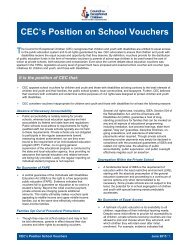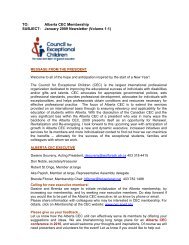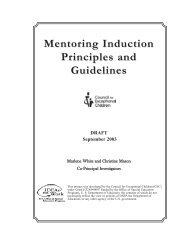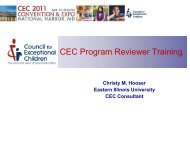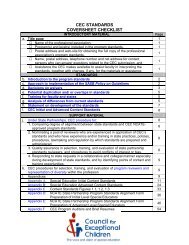What Every Must Know Special Educator - Council for Exceptional ...
What Every Must Know Special Educator - Council for Exceptional ...
What Every Must Know Special Educator - Council for Exceptional ...
You also want an ePaper? Increase the reach of your titles
YUMPU automatically turns print PDFs into web optimized ePapers that Google loves.
access to the evolving knowledge base of effective<br />
practice is essential to maintaining programs that can<br />
respond to the needs of all students with exceptionalities.<br />
To this end, CEC calls upon the federal government<br />
and professional associations, states/provinces,<br />
local school districts, institutions of higher education,<br />
and other relevant entities to commit the necessary<br />
resources to professional development programs that<br />
are grounded in adult learning principles and reflect<br />
professional standards <strong>for</strong> continuing education.<br />
Because effective special education is dependent on<br />
the continuous improvement of what special educators<br />
know and are able to do, CEC believes that all<br />
special education professionals must be committed<br />
to and engage in ongoing professional development<br />
that advances their practice. We further believe that<br />
professionals must have the opportunity to acquire<br />
knowledge and skills through a broad array of venues,<br />
including, but not limited to, institutions of higher<br />
education, professional associations, state/provincial<br />
education agencies, and local school districts. We<br />
further encourage collaboration among all of these<br />
entities in designing and implementing high quality<br />
professional development. Employing agencies must<br />
provide resources, including release time, to enable<br />
each special educator to engage in continuing professional<br />
development throughout her/his career. We<br />
further believe that employers and professional organizations<br />
should recognize and reward special education<br />
professionals <strong>for</strong> improving their knowledge and<br />
skills.<br />
Paragraph 3 - Federal Role in<br />
Personnel Preparation<br />
Through legislation, the federal government has<br />
played a dominant role in supporting initial ef<strong>for</strong>ts to<br />
prepare personnel <strong>for</strong> educating children and youth<br />
with exceptionalities. The <strong>Council</strong> believes that the<br />
federal government should continue and expand its<br />
ef<strong>for</strong>ts to train high level leadership personnel, assist<br />
through leadership and financial support the development<br />
of agencies to prepare personnel, and conduct<br />
research in new systems of preparing and utilizing<br />
personnel and meeting personnel needs. Definitive<br />
data are needed concerning personnel utilization and<br />
retention and other factors of personnel usage.<br />
Paragraph 4 - State, Provincial, and<br />
Local Role in Personnel Preparation<br />
In recent years, state, provincial, and local governments,<br />
in order to improve professional competencies,<br />
have made greater ef<strong>for</strong>ts to support <strong>for</strong>mal training<br />
274 whAt every SpeCiAl eduCAtor muSt <strong>Know</strong><br />
programs in colleges and universities and facilitate<br />
inservice and workshop ef<strong>for</strong>ts. The <strong>Council</strong> believes<br />
that such activities should be increased and that<br />
greater state, provincial, and local financial support<br />
should be given to their development and operation.<br />
The <strong>Council</strong> advocates extension of state, provincial,<br />
and federal funding to new and emerging special<br />
education services.<br />
Paragraph 5 - National Recruitment<br />
Further ef<strong>for</strong>ts need to be undertaken to develop a<br />
national program to attract more qualified and motivated<br />
individuals into the field of special education.<br />
Such a program should include ef<strong>for</strong>ts to recruit more<br />
members from ethnic and multicultural groups into<br />
the field and to provide employment opportunities<br />
<strong>for</strong> those persons trained. The <strong>Council</strong> believes that<br />
such a program must be conducted through national<br />
leadership with full involvement and participation of<br />
all levels of government and professional organizations.<br />
It is only through such a well coordinated ef<strong>for</strong>t<br />
in recruitment that the field’s needs <strong>for</strong> qualified and<br />
motivated personnel can ever be met.<br />
Paragraph 6 - Responsibility<br />
of Higher Education<br />
Colleges and universities have an obligation to develop<br />
and coordinate their resources in support of programs<br />
<strong>for</strong> exceptional children. The obligation comprises a<br />
number of factors:<br />
a. To provide through scholarly inquiry an expanded<br />
knowledge base <strong>for</strong> special education programs.<br />
b. To provide training <strong>for</strong> various professional and<br />
paraprofessional personnel needed to conduct<br />
programs <strong>for</strong> students with exceptionalities.<br />
c. To cooperate in the development and field testing<br />
of innovative programs.<br />
d. To provide <strong>for</strong> the coordinated development of<br />
programs across disciplines and professions so that<br />
training and service models are congruent with<br />
emerging models <strong>for</strong> comprehensive community<br />
services.<br />
e. To provide all students, whether or not they are<br />
in programs relating specifically to children with<br />
exceptionalities, a basis <strong>for</strong> understanding and<br />
appreciating human differences.<br />
f. To exemplify in their own programs of training,




